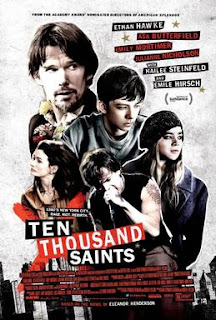Ten Thousand Saints (2015)
After seeing The Edge of Seventeen I took a look at Hailee Steinfeld's filmography and was reminded that she was in a film version of Ten Thousand Saints, adapted from a book I enjoyed. I always wondered what happened to it, and I found out it had a brief theatrical release and then went to VOD and obscurity. I found it on Netflix and streamed it, and it is a faithful and earnest retelling of the book.
I won't delve too deeply into the plot, as you can read that in my book review. It was directed by Shari Springer Berman and Robert Pulcini, who made waves with American Splendor but haven't reached those heights since then, with The Nanny Diaries and Girl Most Likely (though I liked their TV movie Cinema Verite). What fascinates me is how some films that are perfectly fine get buried. Ten Thousand Saints made less than $60,000 theatrically but deserved a better fate.
The film is set in 1988, when the Lower East Side of Manhattan was a waste land and hardcore punk thrived. The book, and the film, are about Jude (Asa Butterfield), who lives a life of quiet desperation in Vermont. His wastrel father (Ethan Hawke) left the family and lives in Manhattan. On New Year's Eve Hawke's girlfriend's daughter (Steinfeld) pays a visit to Butterfield. She goes to a party and has sex with his best friend, Teddy, who dies that night after huffing freon.
She is carrying his baby, though, and with the help of Teddy's brother (Emile Hirsch) concoct a plan to pass Hirsch off as the father. He is a musician and part of the straight edge movement, which eschews sex, drugs, but not rock and roll. He's also a Krishna, and a closeted gay man. Steinfeld's mother (Emily Mortimer) does not approve.
These characters kind of embody a limbo of hopelessness, though a tacked on voiceover tells us that everything is okay (although the film mentions AIDS, it does not identify a character in the book as having AIDS). What the film seems to be really about is very bad parenting. The responsible mother is supposed to be Julianne Nicholson, as Butterfield's mother, but she makes glass bongs and doesn't seem to realize her son smokes weed by the bushel full and huffs turpentine. And Hawke is the perfect example of a bad father. He is a drug dealer, and when Butterfield comes to live with him he sets basically no rules, except a vague, "come home at night." If this film tells us anything, is that many of us survive in spite of our parents.
The performances are generally good, and the scenes of squalor of Alphabet City are right on. It's a little convenient that Steinfeld runs out into the riots of Tompkins Square Park, but most of the film feels authentic, even if my life was never that dangerous.
I won't delve too deeply into the plot, as you can read that in my book review. It was directed by Shari Springer Berman and Robert Pulcini, who made waves with American Splendor but haven't reached those heights since then, with The Nanny Diaries and Girl Most Likely (though I liked their TV movie Cinema Verite). What fascinates me is how some films that are perfectly fine get buried. Ten Thousand Saints made less than $60,000 theatrically but deserved a better fate.
The film is set in 1988, when the Lower East Side of Manhattan was a waste land and hardcore punk thrived. The book, and the film, are about Jude (Asa Butterfield), who lives a life of quiet desperation in Vermont. His wastrel father (Ethan Hawke) left the family and lives in Manhattan. On New Year's Eve Hawke's girlfriend's daughter (Steinfeld) pays a visit to Butterfield. She goes to a party and has sex with his best friend, Teddy, who dies that night after huffing freon.
She is carrying his baby, though, and with the help of Teddy's brother (Emile Hirsch) concoct a plan to pass Hirsch off as the father. He is a musician and part of the straight edge movement, which eschews sex, drugs, but not rock and roll. He's also a Krishna, and a closeted gay man. Steinfeld's mother (Emily Mortimer) does not approve.
These characters kind of embody a limbo of hopelessness, though a tacked on voiceover tells us that everything is okay (although the film mentions AIDS, it does not identify a character in the book as having AIDS). What the film seems to be really about is very bad parenting. The responsible mother is supposed to be Julianne Nicholson, as Butterfield's mother, but she makes glass bongs and doesn't seem to realize her son smokes weed by the bushel full and huffs turpentine. And Hawke is the perfect example of a bad father. He is a drug dealer, and when Butterfield comes to live with him he sets basically no rules, except a vague, "come home at night." If this film tells us anything, is that many of us survive in spite of our parents.
The performances are generally good, and the scenes of squalor of Alphabet City are right on. It's a little convenient that Steinfeld runs out into the riots of Tompkins Square Park, but most of the film feels authentic, even if my life was never that dangerous.



Comments
Post a Comment